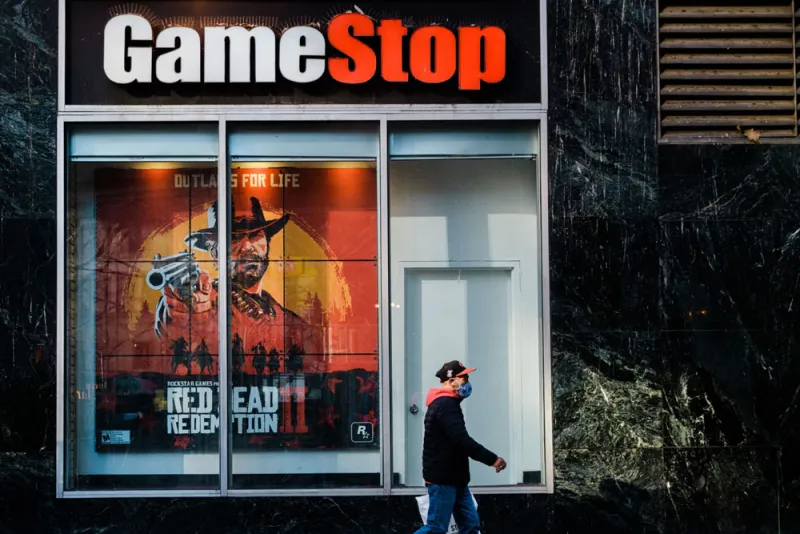No sooner had Citadel forked over billions of dollars to help staunch the bleeding of Melvin Capital — a relatively obscure hedge fund whose short on video game retailer GameStop was subject to a massive short squeeze — than Wall Street wags started whispering: “This is a contagion event.”
And by Wednesday, when a slew of heavily shorted names were still soaring and the Dow ended the day down more than 600 points, one top manager told Institutional Investor that “every long-short hedge fund in the world is getting killed. It’s all about leverage.”
The next fund to be hurt, hedge fund insiders said, could be Maplelane Capital Management, which was also short several of the same names as Melvin.
Both funds had disclosed in their most recent regulatory filings that they owned puts on GameStop, leading retail investors on a now-famous Reddit forum, WallStreetBets, to try and orchestrate a short squeeze on the name — which wasn’t hard, given that 140 percent of its shares had been sold short.
As the stock soared, Melvin secured a $2.75 billion lifeline from Citadel and Point72 Asset Management Monday afternoon.
As was the case for Melvin, many of Maplelane’s 25 disclosed short positions have also been also ripping, including names like Pitney Bowes, which had almost doubled in value before coming down on Wednesday. It’s still up more than 50 percent for the past five days.
“Margin Call Maplelane Capital?” was the heading of a post on Reddit’s Wallstreetbets/new on Wednesday morning.
“Want to cause a margin call on Maplelane Capital. All the info you need is here,” it said, adding a screen shot listing all of Maplelane’s put options, which included other names like GSX Techedu, iRobot, and National Beverage Corp — also shorts of Melvin’s.
Maplelane, like Melvin, was a hot, relatively new fund whose founder came out of a prominent firm shut down as a result of the insider trading scandals that rocked the hedge fund world a decade ago.
Leon Shaulov had been a senior portfolio manager at Galleon Group, whose founder Raj Rajaratnam was convicted of insider trading in 2011. (Melvin’s Gabriel Plotkin had come out of SAC Capital, which pled guilty to insider trading in 2013.)
Galleon shut down in 2009, following Rajaratnam’s arrest, and a year later Shaulov founded Maplelane.
To be clear, neither Plotkin nor Shaulov were tied to any insider trading, and both of their funds had reportedly been stellar performers in recent years.
By the end of last year, Maplelane had amassed $3.7 billion in regulatory assets under management, which includes leverage. Its last quarterly filing with the Securities and Exchange Commission, where it disclosed its long equities positions as well as options, showed a portfolio valued at $5.4 billion — also including leverage.
Both firms appear to have continued to have losses this week. Melvin had lost 30 percent for the year as of last Friday, and Maplelane was down 30 percent, according to the Wall Street Journal.
No one answered the telephone at Maplelane’s New York City office, and Shaulov could not otherwise be reached.
A spokesman for Melvin Capital declined to comment on the size of its losses. However, the fund released a statement that said “Melvin Capital has repositioned our portfolio over the past few days. We have closed out our position in [GameStop].”
It added that “the social media posts about Melvin Capital going bankrupt are categorically false.”
Whatever the fate of those two funds, it has become clear that the pain has become widespread, even as several short sellers said they had stepped back from the market. One told II that he gone to cash.
“The short squeezes are causing major pain,” said another hedge fund short seller earlier this week. “It will trickle over to the long books soon.”
[II Deep Dive: ‘They’re Harassing Me However They Can’: Citron’s Andrew Left on WallStreetBets and Shorting GameStop]
For example, one stock both Maplelane and Melvin were long was Fiserv, which has been tumbling since January 8 and is now down more than 9 percent for the year.
In general, the reason the overall market has fallen is that many hedge funds were in the same trade — “long Nasdaq names and short dying retailers,” one manager said. “Those funds that have massive market neutral strategies that use a lot of leverage would also have to de-lever.”
And while the Reddit users on WallStreetBets may have been the catalyst for the hedge fund woes, many people defended them.
Chamath Palihapitiya, the Silicon Valley entrepreneur, was the most vocal. Speaking on CNBC’s Halftime Report Wednesday, he said retail investors did nothing wrong.
Palihapitiya, who had tweeted around noon Tuesday that he had bought February $115 calls on GameStop — leading it to spike — argued on CNBC that the solution to the chaos the market is experiencing now is to force hedge funds to disclose their positions — both short and long — as well as their leverage, on a daily basis.
He also suggested it should not be legal to short more than 100 percent of the shares of a company. “The lack of integrity in the system is the precursor that caused [GameStop] to be sold short 140 percent,” Palihapitiya argued.
The problem, he added, is that hedge funds “are allowed to take their money to a prime broker and all of a sudden get 10x notional on that.”
Several hedge fund managers told II that they, too, are sympathetic to the Reddit retail investors.
“It’s terrible because you’ve got me sitting here, taking short pain caused by these guys, still half-way rooting for them!” one hedge fund manager at a short-biased fund said in a direct message on Twitter. “That’s the state of affairs.”







